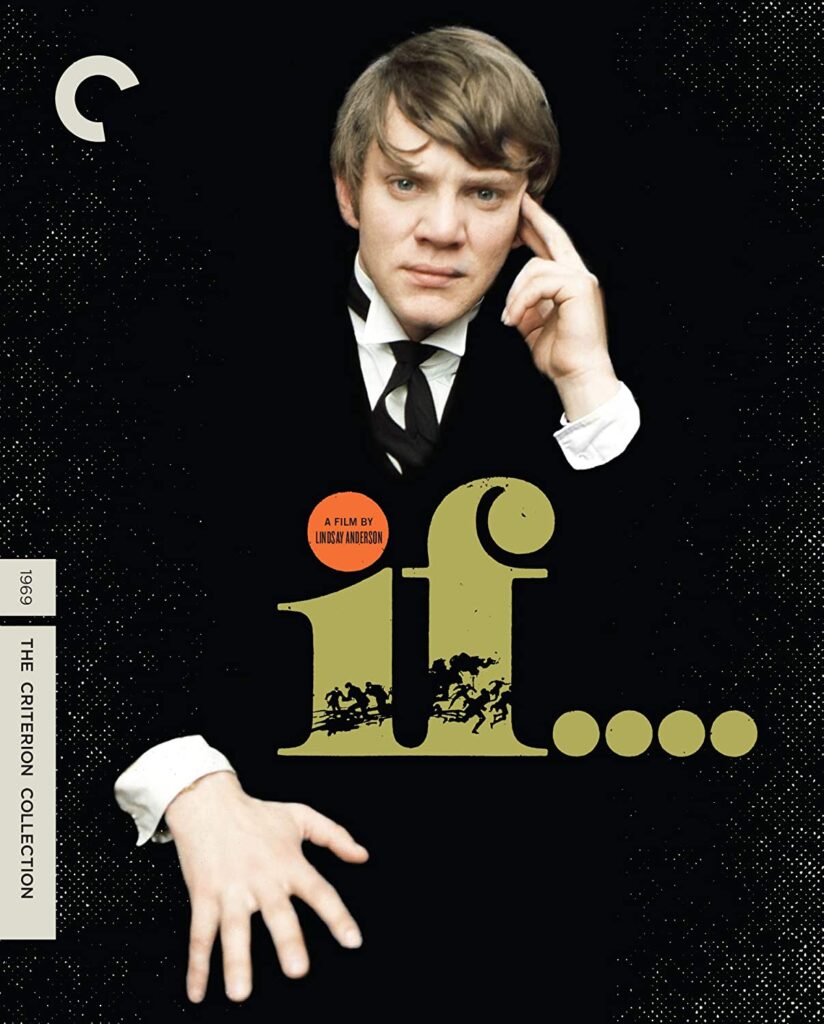
Director Lindsay Anderson’s If…. is a film that catches the viewer off guard when its true intention is revealed and its ability to generate a strong reaction has been increased by the events of history, which isn’t necessarily to the benefit of the film’s message.
When If…. opens, a new term is beginning at a British boarding school for boys in the 1960s, and the familiar character types are introduced: members of the administration are aloof, the new seniors (Whips) exert their power over the juniors and underclassmen, and there is a trio of rebellious upstarts, led by Mick Travis (Malcolm McDowell in his film debut), to shake things up.
The trio frequently breaks the rules. They drink alcohol, steal a motorcycle from a local dealership, and Wallace (Richard Warwick) has a physical relationship with a younger student. Finally, enough becomes enough, and the Whips gather the three for corporal punishment. Mick being the ringleader gets the most swats. They are brutal but Mick forces himself not to show they hurt. This pushes Mick and his friends to respond with drastic action and deadly results.
If…. was influenced by the civil unrest towards societal standards, such as the May 1968 worker’s protest in France and the “Angry Young Man” movement in theater and novels of the 1950s. The dynamics of the school attendees are used as metaphor for the inequity and unfairness in society. Mick, who decorates his dorm walls with gun-toting males and says, “Violence and revolution are the only pure acts,” is shown exacting his revenge with guns from a rooftop. While Mick is shown in close-up firing away at those below, the film cuts to black and then the title fades in.
The main reason If…. is so captivating is because of McDowell’s performance. It’s hard to believe this is his film debut. He is a natural presence on screen and exudes such confidence that he commands the viewer’s attention. It’s easy to see why Stanley Kubrick wanted him for the lead in A Clockwork Orange.
Occasionally, the film appears in black and white. Though some may find meaning in its use, a number of reasons have been given over the years from different sources, including on this disc, from artistic choices to practical necessity, but the definitive reason is unclear.
Although the film’s final sequence is a fantasy of Mick’s, its message of a call to arms for the downtrodden and a warning to the powerful is troubling because it brings to mind murderous students, from places like Columbine High School and Virginia Tech University, whose problems weren’t solved by violence and murder.
Both cinematographer Miroslav Ondricek and assistant editor Ian Rakoff approved this new 1080p/MPEG-4 AVC transfer from an original 35 mm interpositive, which is displayed at 1.66:1. The colors are presented as strong, medium hues, and the blacks are rich. Details are impressive throughout, particularly in the textures of the surroundings. The black and white material is consistent in the quality of its appearance. It offers many shades across the gray scale and good contrast.
The audio is a mono track remastered from the magnetic tracks. It has been cleaned up digitally and sounds free of defects. The dialogue is clear throughout. The sound effects from the final sequence are effective but limited.
The commentary is comprised of individual sessions by film critic David Robinson from 2007 and Malcolm McDowell in 2002. Not surprisingly, the latter is the more engaging of the two. A 2003 episode from BBC Scotland’s cinema series Cast and Crew (1080i, 42 min) gathers Ondricek, Rakoff, assistant to the director Stephen Frears, producer Michael Medwin, and screenwriter David Sherwin to discuss Lindsay Anderson and the film. McDowell appears through interviews conducted at a different time while he was in LA. Recorded in 2007, actor “Graham Crowden” (1080i, 15 min), who played the History Master, talks about working with Anderson in the theatre and on If…. Directed by Lindsay Anderson and Guy Brenton and narrated by Richard Burton, “Thursday’s Children” (HD, 23 min) looks at the Royal School for Deaf Children Margate in England and the students. It won the Academy Award for Best Short Documentary in 1955. An illustrated booklet that contains an essay by critic David Ehrenstein and pieces by David Sherwin and Lindsay Anderson accompanies the disc.